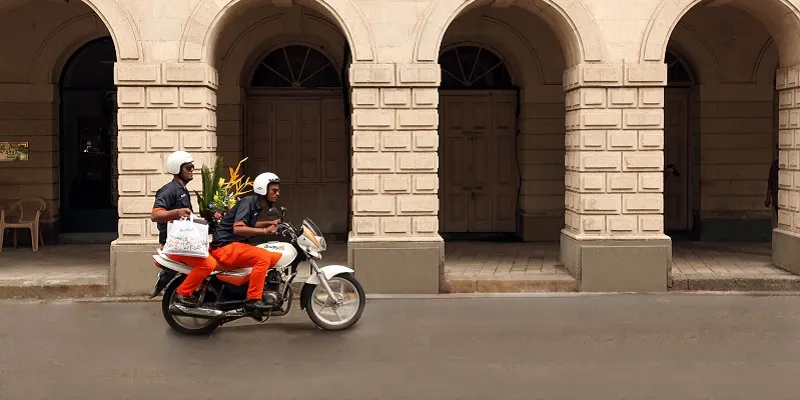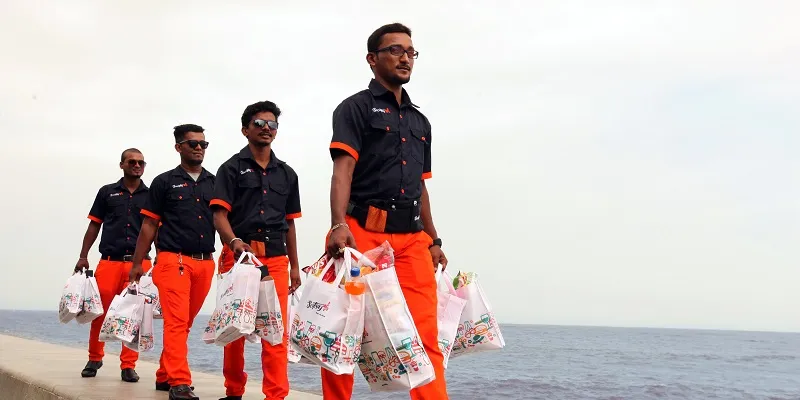From SOS needs to those Sloppy Joe’s from your favourite restaurant, Scootsy delivers it all
Starting at a time when foodtech and delivery was no longer sexy, Scootsy looks at delivery across sectors and not just food or groceries.
A year back, the startup world was chock full of hyperlocal and foodtech startups. Many were curating and delivering food, groceries, and throwing about promises—“organising an unorganised market” and “solving a latent need”—that would attract any venture capital firm.
And then the dominos started falling: TinyOwl, once touted to be a rising star in the space, plummeted, and redBus mafia startup Dazo shut shop. A few, however, like Swiggy, FreshMenu and Zomato, survived the frenzy and bloodbath.
Finding order in chaos
It was during this frenzy, Burrp’s former COO Sandeep Das and Antfarm co-founder and MD Rishi Khiani began looking at the space more closely. They realised that no one company was focussing on delivery for a wide variety of sectors. It was then they decided to start Scootsy in Mumbai to do delivery across different sectors.
“There were a lot of companies focusing on food only. We decided in this age where our days are devoid of usable time, people are looking out for convenience and instant gratification not just for food but for items across the board. Scootsy came into being once we realised that need,” says Rishi.
Today, Scootsy delivers a broad selection of products in Mumbai - including food, fashion, books, gifts, fashion and SOS items.

Working an ops-intensive business
However, anybody who has ventured into the delivery segment realises that the task is operations and logistics-intensive. Also, the market in India is truly fragmented. The initial challenge that the Scootsy team faced was in convincing the vendors, especially those who weren’t equipped for delivery to get on board.

“We ended up working closely with a lot of vendors and almost working backwards in order for them to get the delivery menu and packaging right,” adds Sandeep.
He adds that it was also challenging from a tech and logistics perspective, creating algorithms for delivery efficiencies. Once they had the product and tech in place, they also had to get consumers used to the concept of instant gratification in sectors other than food.
“Lastly, being bootstrapped was a challenge as we had to be conservative with our marketing spends. We focussed on guerrilla marketing, such as letting our uniformed riders in bright orange spread awareness for the brand. We also worked on getting exclusive vendors on board such as Le15 Patisserie, Suzette, The Table, Hamleys and ROYCE’ Chocolate,” says Rishi.
Scootsy claims to offer the best, exclusive and the most popular food options, gifts and emergency needs.
Working in an exclusive and premium segment
However, in a hyper-crowded market, it was essential to bring in the right differentiator. So the team began to focus on bringing and adding on a larger gamut of premium brands on the platform. They also worked with exclusive vendors to give exclusive offerings having Scootsy-specific menus.

An example of this was when Le15 Patisserie created a special macaron for Scootsy that was inspired by the nimbu mirchi hanging on every scooter and car.
The team also made a conscious decision not to charge their customers a delivery fee. The team claims that their revenue comes from a commission they charge vendors for every sale through Scootsy.
“Scootsy is not just a delivery brand, we are also a discovery platform that is highly curated and we have helped our customers discover brands and products that they were not previously privy to,” adds Rishi.
A big and crowded market
The Indian gourmet food market is currently valued at $1.3 billion and is growing at a compound annual growth rate (CAGR) of 20 percent. India’s organic food market is expected to increase by three times by 2020.
The online food ordering business in India is still in its nascent stage, but has an exponential growth ahead. The report also stated that the organised food business in India is worth $48 billion, of which food delivery is valued at $15 billion.

Some of the Mumbai-specific food delivery startups include – SpiceBox, Hola Chef and Oye Kiddan. In the first quarter of this year, $51,500,00 was pumped into food tech startups across 10 deals. Two of the big deals in the food space have been Series-A funding by FreshMenu and Series-C funding of $35 million by Swiggy.
However, Scootsy isn’t just restricted to food. Their services are across a broad segment of verticals, ranging from food to fashion, books to beauty and gifts to SOS items. Sandeep adds that no other brand ensures timely deliveries that span the breadth of verticals that they do and therefore Scootsy does not have any direct competition at the moment.
“If we look at the food sector then we have a few competitors though they have average transaction sizes one-third of ours. In the e-commerce space, we compete with all the big players,” adds Rishi
The team claims to be hitting 65,000 orders a month and have been growing 30 percent month on month. The team is soon looking to expand to Delhi and Dubai.







